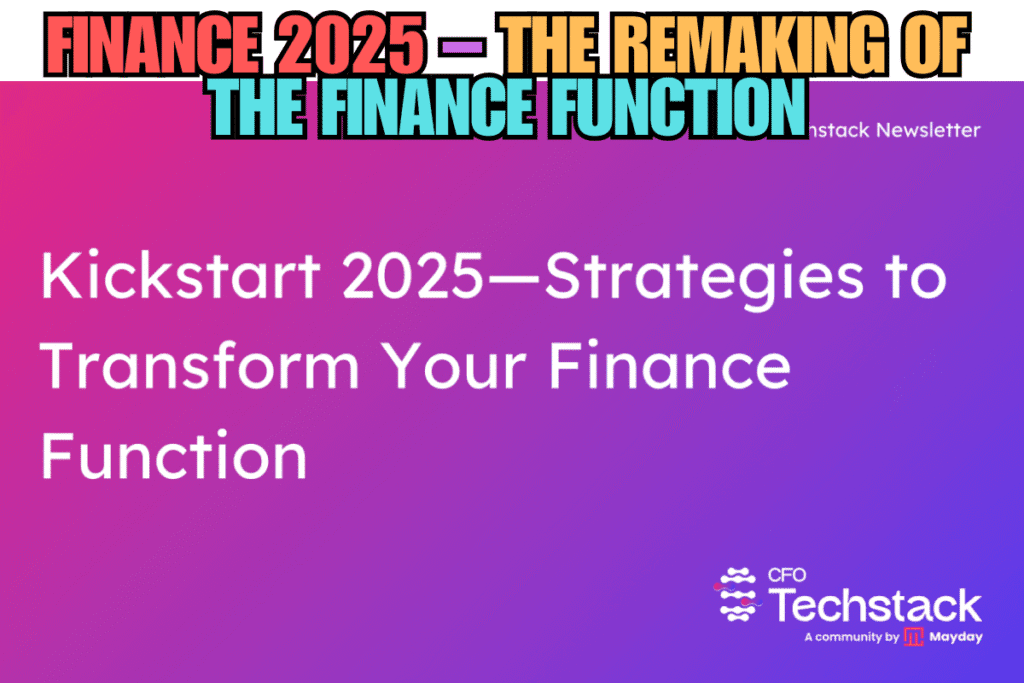The calendar has flipped, and we’re squarely in Finance 2025 – Focus on the finance function of the future. This isn’t a distant horizon anymore; it’s the present reality demanding a radical rethink of traditional roles, processes, and technologies within finance departments. The days of finance being solely about number crunching and historical reporting are fading fast. Today, and increasingly so, the finance function is morphing into a strategic nerve center, a key driver of business value, and a crucial partner in navigating an ever-complex global landscape.
Having witnessed this evolution accelerate over the past few years, particularly with the rapid advancements in technology and the increasing demand for data-driven insights, I can confidently say that the finance function of the future is less about debits and credits and more about foresight and influence. This isn’t just an academic observation; it’s a practical imperative for organizations aiming to thrive in the years ahead. Let’s dissect the key elements shaping Finance 2025 – Focus on the finance function of the future.
The Strategic Shift: From Scorekeeper to Navigator
The most significant transformation in the finance function is its evolving role from a historical reporter to a strategic business partner (The future of finance | KPMG UK). This involves:
- Becoming Insight Generators: Finance teams are no longer just presenting past data; they are leveraging advanced analytics and AI to extract meaningful insights that inform strategic decision-making across the organization (Top trends to impact the finance function – Canon Europe).
- Driving Business Performance: Finance professionals are increasingly involved in performance management, working with other departments to set targets, track KPIs, and provide guidance on resource allocation to achieve strategic goals (The Future of the Finance Function | BCG).
- Risk Management and Mitigation: With increasing economic volatility and regulatory complexity, finance plays a crucial role in identifying, assessing, and mitigating financial risks, ensuring the organization’s resilience (What’s important to the CFO in 2025 – PwC).
Personal Insight: I’ve seen finance teams transition from simply providing monthly reports to actively participating in strategic planning sessions, offering valuable perspectives on financial implications and potential risks associated with various business initiatives. This proactive involvement significantly enhances the overall strategic agility of the organization.
The Technological Tsunami: Automation and AI at the Core
Technology is the engine driving the transformation of the finance function. Automation and Artificial Intelligence (AI) are no longer optional; they are fundamental to achieving efficiency, accuracy, and strategic value (How CFOs and finance teams can improve financial processes in 2025 – Sage).
- Hyper-Automation of Routine Tasks: Robotic Process Automation (RPA) and intelligent automation are taking over mundane, repetitive tasks like data entry, invoice processing, and reconciliation, freeing up finance professionals for more strategic activities (The finance function of the future: Transform or perish).
- AI-Powered Analytics and Forecasting: AI and machine learning algorithms are enabling more accurate and sophisticated financial forecasting, predictive analytics, and anomaly detection, providing deeper insights into future trends and potential risks (It’s 2025. What Does That Mean for Finance? – insightsoftware).
- Cloud-Based Finance Systems: Cloud technology provides the scalability, flexibility, and accessibility needed for modern finance operations, enabling real-time data access and collaboration across different locations (2025 Revisited: Future Finance Trends – Deloitte).
Personal Insight: Implementing cloud-based accounting software and automation tools has dramatically reduced the time spent on manual data processing in organizations I’ve worked with. This shift has allowed finance teams to dedicate more resources to analyzing data and providing strategic insights to other departments.
The Data-Driven Imperative: Information as a Strategic Asset
In Finance 2025 – Focus on the finance function of the future, data is king. The ability to effectively manage, analyze, and interpret vast amounts of financial and non-financial data is crucial (Top trends to impact the finance function – Canon Europe).
- Establishing a Single Source of Truth: Breaking down data silos and creating a unified data platform is essential for generating consistent and reliable insights across the organization (Future of finance: Turn tech into a competitive advantage – PwC).
- Advanced Data Visualization: Tools that can transform complex data sets into easily understandable visuals are becoming increasingly important for communicating financial insights to non-finance stakeholders.
- Integrating External Data: Combining internal financial data with external market trends, economic indicators, and customer data provides a more holistic view for strategic decision-making.
Personal Insight: I’ve seen the power of integrated data dashboards in providing real-time visibility into key performance indicators, enabling faster identification of trends and more agile responses to market changes. The ability to connect financial data with operational metrics provides a much richer understanding of business performance.
The Evolving Talent Landscape: New Skills for a New Era
The changing role of finance and the increasing reliance on technology demand a new set of skills within the finance function (Evolution of the Finance Function: Drivers for 2025 – AvidXchange).
- Data Literacy and Analytics: Finance professionals need to be proficient in data analysis, statistical modeling, and data visualization tools.
- Technology Acumen: Understanding and leveraging various financial technologies, including ERP systems, automation tools, and AI platforms, is becoming essential.
- Business Acumen and Communication: The ability to understand the broader business context and effectively communicate financial insights to non-financial stakeholders is crucial for strategic partnership.
- Soft Skills: Collaboration, critical thinking, and problem-solving skills are increasingly important as finance teams work more closely with other departments.
Personal Insight: I’ve noticed a growing demand for finance professionals with a blend of traditional accounting knowledge and strong analytical and technological skills. Organizations are investing in training programs to upskill their finance teams and attract talent with these evolving competencies.
The Focus on ESG: Finance as a Driver of Sustainability
Environmental, Social, and Governance (ESG) factors are no longer a peripheral concern for finance; they are becoming integral to financial reporting, risk assessment, and investment decisions (It’s 2025. What Does That Mean for Finance? – insightsoftware).
- ESG Reporting and Compliance: Finance teams are increasingly responsible for collecting, analyzing, and reporting ESG data to meet regulatory requirements and stakeholder expectations.
- Integrating ESG into Investment Decisions: Investors are increasingly considering ESG factors when making investment choices, requiring finance professionals to understand and incorporate these metrics into valuation and risk assessments.
- Driving Sustainable Business Practices: Finance can play a key role in promoting sustainable business practices by tracking and reporting on environmental and social impact and aligning financial incentives with ESG goals.
Personal Insight: I’ve seen a significant increase in the demand for ESG reporting frameworks and the integration of sustainability metrics into financial performance indicators. Finance teams are collaborating with sustainability departments to develop comprehensive and transparent ESG disclosures.
Conclusion: Embracing the Future of Finance
Finance 2025 – Focus on the finance function of the future is about embracing a fundamental shift. It’s about moving beyond traditional accounting roles to become strategic advisors, leveraging technology to automate routine tasks and unlock valuable insights from data, developing new skill sets, and integrating sustainability into the core of financial operations. The finance function of the future is agile, data-driven, technologically savvy, and deeply integrated into the strategic fabric of the organization.
The organizations that proactively adapt to these trends and empower their finance teams to embrace this new era will be best positioned for long-term success in an increasingly complex and dynamic business environment. The future of finance is not just about numbers; it’s about vision, influence, and driving sustainable value creation.
What are your perspectives on the Finance 2025 – Focus on the finance function of the future? Which of these trends do you see having the biggest impact on your organization or career? Share your thoughts in the comments below!



